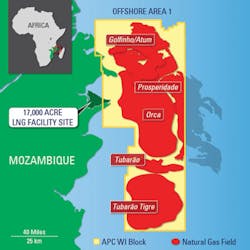Emerging East African offshore industry drives demand for technology, services
Mozambique LNG exports expected to begin in 2021
Jennifer Stone Marshall, Curt Cultice
Commercial Service, US Department of Commerce
The string of natural gas discoveriesoffshore Mozambique, amounting to more than 100 tcf, could position the country among the world’s largest natural gas producers by 2021. The technology and infrastructure needed to get this and other natural resources to international markets is driving economic development in the local oil and gas industry.
In the below Q&A, Fiyona Guitunga, commercial assistant with the US Embassy in Maputo, Mozambique, discusses these opportunities. She is part of the US Commercial Service’s worldwide network of offices in more than 100 US cities and US embassies and consulates in more than 75 countries that help US companies export.
US Department of Commerce (DoC): Mozambique is a new post for the US Commercial Service. What is the economic outlook for the country?
Guitunga: The economic growth outlook for Mozambique is positive despite the lower growth this year. The economy is expected to grow due to the recent natural gas discoveries accompanied by other emerging industries. Public expenditures and foreign direct investment are the main drivers of growth. According to the World Bank’s Country Report, Mozambique’s annual growth averaged 7% over the two last decades. However, during the last quarter of 2015, the depreciation of the metical (the currency in Mozambique) against the dollar had an unfavorable impact on economic activity, resulting in a lower GDP growth rate of 5.9% for the year.
Once the final investment agreement is made between the Mozambican government and Anadarko, the main operator of the natural gas field in Area 1, it is likely to trigger significant economic growth in the country through greater access to natural gas that will go toward electrical generation and increased exports, while acting as a catalyst for increased foreign direct investment. In addition to natural gas, the mining of coal, graphite, and semi-precious stones are also becoming important export industries, and are driving the development of deepwater ports and interior transport systems to move goods to East African and global markets. The modernization of ports and transport infrastructure will also benefit the natural gas equipment supply chain.
DoC: What has been the country’s reaction to the discovery of natural gas in the Rovuma basin and the resulting foreign investment?
Guitunga: There is a lot of excitement in the government and private sector. Despite the low price of oil and natural gas around the world, the discovery could bring a lot of prosperity to the country if developed prudently. Further, the government is carefully considering the impacts of the discovery on the economy, and is seeking to promote broad economic growth and a higher standard of living for its citizens.
DoC: What kinds of export opportunities for US businesses could result from the discovery? Are there sectors with the most potential, or supply chain opportunities?
Guitunga: Natural gas exports from the offshore Area 1 are not likely until 2021. Once LNG infrastructure facilities are constructed and delivery contracts signed, natural gas exports are anticipated to begin that same year. However, building the infrastructure necessary to extract and transport the offshore gas to onshore storage port facilities is a major effort. The LNG project and the gas deposits are of such great size that the infrastructure to build and operate it requires significant development in the remote location site. This will in turn drive the development of all sectors in the region. Once LNG exports begin in 2021, the additional revenue will enable Mozambique to upgrade its educational and healthcare systems, improve its travel and tourism centers, and develop other sectors.
DoC: What are the specific local content requirements as they apply to the offshore oil and gas industry, and are they attracting foreign investment into the industry?
Guitunga: Mozambique’s local content requirements continue to evolve, especially with regard to local employment. Under Mozambique’s labor laws, there are established limits for the number of foreigners that can be hired. However, companies may be able to negotiate this quota when they set up their businesses, if they can prove a lack of locally skilled labor. Further, the country’s local content vision is reflected in its 2014 updated Petroleum Law. The law stipulates for the oil and gas sector that a purchasing preference be granted to Mozambican goods and services to the extent they are of comparable quality to foreign goods and services and their cost does not exceed that of foreign goods and services by more than 10%. The law also promotes opportunities for local companies to hold equity stakes in oil and gas projects and requires that operators and service companies provide employment and training for Mozambican nationals.
DoC: Can you tell us more about the opportunities for technology transfer and for offshore equipment suppliers?
Guitunga: The oil and gas sector is relatively new for Mozambican companies, illustrated by the lack of local manufacturing. Local companies will initially rely on foreign suppliers for the equipment and the technology necessary to become a local supplier. There is a vital necessity for the private sector, as well as government agencies, to obtain the appropriate technology and equipment to qualify as service providers. For the next five years, opportunities will be related to the construction of both Anadarko’s LNG and Eni’s FLNG projects. There will be a demand for compressors, pumps, vessels, filters, transformers, wire and cable, pipeline systems, and welding equipment.
DoC: What are the gaps in the local offshore oil and gas market that could be filled by foreign operators and technology providers?
Guitunga: Mozambique is an emerging market striving to adopt international business standards. Companies, especially small and medium-sized firms (SMEs), also face challenges to adopting these global business standards. There is a need for expertise, project funding, and products in almost every sector. This is especially true for SME equipment suppliers. As the country brings its newfound natural gas resources to global markets, it will need investment and technology transfer from foreign entities in every aspect of drilling, liquefaction, distribution, marketing, and selling this resource to world markets.
DoC: What are the financing conditions for local buyers?
Guitunga: It can be hard for local companies to access credit. The appreciation of the US dollar and limits on taking money out of country create more difficulty. American companies that provide credit solutions are competitive. US financing agencies, US Export-Import Bank and Overseas Private Investment Corp., can also support US exporters. Both agencies have an interest in working in Mozambique.
DoC: What are the benefits of doing business in Mozambique?
Guitunga: The natural gas discoveries are immense and the quality is good. There are additional oil and gas exploration projects that are expected to identify additional reserves. So for the oil and gas industry, Mozambique is likely a long-term source of projects. Its location on the eastern coast of Africa is expected to make it a strategic supplier to emerging markets in India and the Far East where demand is expected to grow for oil and gas.
DoC: How receptive is the country to American products and services? What other countries trade and invest in Mozambique?
Guitunga: Mozambicans are very receptive to US-branded products/services and perceive them to be of high quality. Buyers of consumer products as well as equipment resellers are pleased to see additional US brands coming into the market. As a former Portuguese colony, Mozambique has strong cultural and trade ties to Portugal and the European Union as well to Brazil, a dominant investor country with a common language. China has provided foreign assistance and is involved in many infrastructure projects. In the oil and gas sector, European firms Eni (Italy), Shell (Netherlands), and Statoil (Norway) have a presence. ExxonMobil recently won three areas for research and exploration concession contracts and Anadarko is about to develop one of the world’s largest LNG projects. More US companies are expected to enter the market as opportunities develop.
DoC: Have there been recent successes of other American companies in Mozambique?
Guitunga: Yes. GE is a recent success story. They established an office in Maputo and are successfully pursuing business in the oil and gas as well as transportation fields. Other successful US exporters include Caterpillar, Coca-Cola, NCR, Radisson, Hertz, Fluor, FedEx, UPS, ExxonMobil, Cargill, Proctor & Gamble, and more.
DoC: What should US exporters know about doing business in Mozambique? Should only experienced exporters consider it as a potential market?
Guitunga: The country is still an emerging economy with challenges that are common in many developing markets. Projects usually take time to develop and there are substantial risks that go along with the potential for substantial rewards. Experienced exporters will definitely have an advantage.
DoC: Do American companies have to find local partners in order to pursue business in Mozambique?
Guitunga:While Mozambique law does not as a general rule require foreign companies to have a local partner, it is preferred by most US companies doing business there. Foreign companies must comply with quotas for hiring local employees and purchasing content from local suppliers. Additionally, a local company can help their US partner with customs issues and market research. As in other markets, US companies will find that relying on Mozambican partners to import, sell, and service their equipment can be a wise entry strategy.
DoC: How can US exporters identify and pursue business opportunities related to the natural gas discovery?
Guitunga: The US Commercial Service Mozambique provides assistance to US exporters who are interested in entering the market. Another way to pursue opportunities in Mozambique would be to look for supply chain opportunities through US companies already doing business there. Examples include Anadarko, a key operator in the Rovuma basin, and Chicago Bridge & Iron, one of the EPC contractors of the LNG project.


